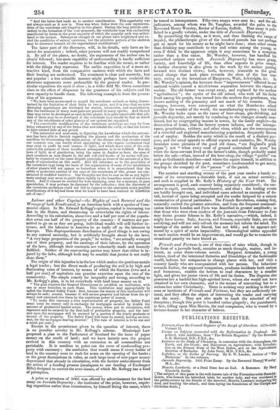A prize or premium of 100/. was offered by advertisement
for the best essay on Juvenile Depravity ; the institutor of the prize, however, requir- ing exposition rather than examination, by himself fixing the cause, which he traced to intemperance. Fifty-two essays were sent in; and the ad. judicators, among whom was Dr. Vaughan, awarded the palm to the Reverend Henry Worsley, Rector of Easton, Suffolk. That essay is pub- lished in a goodly volume, under the title of Juvenile Depravity. By prescribing the theme, as it were, and thus limiting the range of inquiry, the philanthropic giver of the hundred pounds has not perhaps got as much for his money as he might have done ; since other causes than drinking may contribute to vice and crime among the young, or even if drink be the apparent origin it may sometimes be a symptom rather than a first cause. Mr. Worsley, however, has handled his prescribed subject very well. Juvenile Depravity has more grasp, variety, and knowledge of life, than often appears in prize essays. A further character is also given to the work by the author putting forward two distinct views ; both, however, traceable to the great social change that took place towards the close of the last cen- tury, owing to the inventions of Hargraves, Watt, Arkwright, &e. he Mr. Worsley's opinion, the increase these " improvements " effected in our national wealth caused a mischievous separation between the classes of society. The old farmer was swept away, and replaced by the modem " agriculturist "; the squire of the old school, who with all his faults lived among his people, was turned into the modern fine gentleman, who knows nothing of the peasantry and not much of his tenants. These changes, however, were consequent on what the Manchester school consider the wonder of the world, the manufacturing system ; but which Mr. Worsley looks upon as the cause of beer-shops, gin-drinking, and juvenile depravity, not merely by conducing to the changes already men- tioned, but by congregating masses in towns, by the family neglect—the destruction of home, that the factory system induces, and the intempe- rance, prostitution, robbery, and other vices, which are the consequences of a crowded and neglected manufacturing population, frequently thrown out of employ. Besides the unity which is the result of a distinct pur- pose, and the usual appeals to official reports and statistics, Mr. Worsley furnishes some pictures of the good old times, "ere England's griefs began"; not "when every rood of ground maintained its man, but when the farm-servant lived at the farmer's table, though probably seated below the salt—when, instead of the beer-shop, the village "public" was such as Goldsmith describes—and where the squire himself, in addition to the groups sketched by the poet, sometimes condescended to get merry, mayhap in the company of the " parson " of the parish.


























 Previous page
Previous page